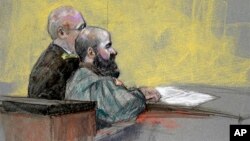HOUSTON —
In the punishment phase of the Fort Hood massacre trial at the military base in Texas Tuesday, Major Nidal Hasan rested without presenting witnesses or making a statement. Last week, Hasan was convicted of murdering 13 people in a shooting rampage at Fort Hood on November 5, 2009. After summation statements Wednesday, the decision on whether to apply the death penalty will be in the hands of the 13-member jury.
After prosecutors concluded their presentation of witnesses who had lost loved ones or been wounded by Nidal Hasan, they rested their case. It was then Hasan's turn to either bring forth witnesses or make a statement. As he has done in other stages of the trial, the defendant, who is serving as his own lawyer, rested his case immediately and said no more.
Presiding Judge Colonel Tara Osborn dismissed the jury and then questioned Hasan thoroughly to make sure he understood the implications of his decision.
Geoffrey Corn, a former military prosecutor who now teaches at the South Texas College of Law in Houston, says the judge's effort will make a later appeal less likely and ensure that Hasan has voluntarily accepted the risks involved in his decisions.
"Judge Osborn does not have an interest in making sure that the case stands up on appeal; she has an interest in making sure that the defendant is fully appraised of his constitutional and statutory rights and is able to exercise them voluntarily," he said.
By refusing to speak, Hasan gave up his last opportunity to present evidence or any kind of argument to the jury. Corn says Hasan, motivated by his belief in radical, jihadist Islam, believes murdering 13 people and wounding more than 30 others was justified.
"I think what he is doing is expressing passively his disdain for the army and his disdain for the military justice system, by doing nothing," he said.
On Wednesday, the prosecution will give its closing summation of the evidence supporting the death penalty for Hasan, rather than life in prison. At that point, Hasan will have an opportunity to present a closing summation, but since he has presented no evidence, Geoffrey Corn says Hasan most likely will say nothing.
The jury, or panel as it is known in military law, does not have a lot of evidence to go through, as it did in the first phase of the trial, but Corn says the 13 panel members will consider the question carefully.
"There isn't a whole lot of evidence to review, but they have to each, individually decide whether to put a human being to death and, I think, that is a big deal," he said. "I think, morally and legally, it should be hard. These are people who understand life and death, perhaps better than most of us ever will, because of their profession, and I think they are going to take it very seriously."
To impose the death penalty in a military capital murder case, the jurors must make a unanimous decision. Corn says he does not expect a very quick decision, but thinks a verdict is likely by late afternoon.
After prosecutors concluded their presentation of witnesses who had lost loved ones or been wounded by Nidal Hasan, they rested their case. It was then Hasan's turn to either bring forth witnesses or make a statement. As he has done in other stages of the trial, the defendant, who is serving as his own lawyer, rested his case immediately and said no more.
Presiding Judge Colonel Tara Osborn dismissed the jury and then questioned Hasan thoroughly to make sure he understood the implications of his decision.
Geoffrey Corn, a former military prosecutor who now teaches at the South Texas College of Law in Houston, says the judge's effort will make a later appeal less likely and ensure that Hasan has voluntarily accepted the risks involved in his decisions.
"Judge Osborn does not have an interest in making sure that the case stands up on appeal; she has an interest in making sure that the defendant is fully appraised of his constitutional and statutory rights and is able to exercise them voluntarily," he said.
By refusing to speak, Hasan gave up his last opportunity to present evidence or any kind of argument to the jury. Corn says Hasan, motivated by his belief in radical, jihadist Islam, believes murdering 13 people and wounding more than 30 others was justified.
"I think what he is doing is expressing passively his disdain for the army and his disdain for the military justice system, by doing nothing," he said.
On Wednesday, the prosecution will give its closing summation of the evidence supporting the death penalty for Hasan, rather than life in prison. At that point, Hasan will have an opportunity to present a closing summation, but since he has presented no evidence, Geoffrey Corn says Hasan most likely will say nothing.
The jury, or panel as it is known in military law, does not have a lot of evidence to go through, as it did in the first phase of the trial, but Corn says the 13 panel members will consider the question carefully.
"There isn't a whole lot of evidence to review, but they have to each, individually decide whether to put a human being to death and, I think, that is a big deal," he said. "I think, morally and legally, it should be hard. These are people who understand life and death, perhaps better than most of us ever will, because of their profession, and I think they are going to take it very seriously."
To impose the death penalty in a military capital murder case, the jurors must make a unanimous decision. Corn says he does not expect a very quick decision, but thinks a verdict is likely by late afternoon.









